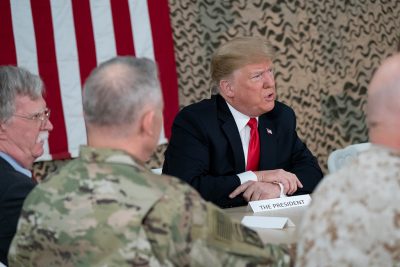Iraq Rejects Iran Sanctions and US Troop Presence
In another blow to US control on Iraq, the country’s foreign minister warned that Baghdad would ignore US sanctions on Iran.

Speaking to journalists on Wednesday, Iraqi Foreign Minister Mohammed Ali al-Hakim laid out the latest step on the path to independence for Baghdad from the US concerning sanctions on Iran by Washington. Although Iraq currently has a 90-day waiver to trade with Iran issued on December 20th, Hakim let reporters know Iraq would be pursuing their own policy on Iran should the waiver not be renewed.
Hakim explained to reporters that
“These sanctions, the siege, or what is called the embargo,” imposed by the US is “unilateral, not international,” and Iraq is “not obliged [to follow] them.”
This is a big step for Baghdad to take in the face of pressure from Washington for Iraq to become “energy independent” with the help of US corporations exploiting their oil and gas resources. Instead, as explained by Hakim, Iraq would rather choose their own options for energy, even if that includes continuing the annual $12 billion in trade between Iraq and Iran flowing over US objections.
There are also discussions ongoing concerning increasing the amount of trade between Baghdad and Tehran despite US pressure. Iraqi President Barham Salih and his Iranian President Hassan Rouhani even doubled down on this during a recent meeting where Rouhani said that Tehran was willing to increase trade with Baghdad from the $12 billion a year mark to $20 billion.
Hakim assured reporters Iraq is already thinking of “solutions” to counteract any US threats to increased trade with Iran. According to Hakim, there are multiple options open to Baghdad “including dealing in Iraqi dinars in bilateral trade” as opposed to US dollars.
Iraqi Sovereignty: From Sanctions to Bases
This defiance to US sanctions is only the latest step in Iraq declaring independence from Washington. Another sign that the US is losing their grip on Baghdad was also made apparent last week when, after Trump made a surprise visit to US troops in Iraq, fueling outrage among Iraqi politicians.
Many Iraqi leaders called Trump’s surprise visit to their country a violation of their nation’s sovereignty. This has ended up leading to a wider backlash and resulted in multiple Iraqi politicians demanding a complete end to the US military presence in the country.
This all comes as the Trump regime is attempting to cement new positions in the Middle East by way of new bases on the Iraq-Syria border. According to some Iraqi MPs such as Badr al-Zaidi who has said that the new bases violate “agreements between Iraq and the US were on the pullout of foreign forces from Iraq after 2013.”
Even US-ally and supporter of the NATO occupation, former Prime Minister Haider al-Abadi rejected the “method of Trump’s visit,” saying “it was not appropriate to diplomatic mores and to relations with sovereign states.”
These insults to Iraq have led to a wave of Iraqi lawmakers demanding more than an apology and saying the Iraqi government would move to make a “parliamentary decision to expel (Trump’s) military forces” in the words of Qais Khazali, an Iraqi politician. Much like with the rejection of the Iran sanctions, Khazali also promised his faction of the government (backed by Shia militias) also had creative “solutions” to dealing with US pressure on Iraq including “experience and ability to get them out in another way that is well known to your forces, which were forced to withdraw in humiliation in 2011.”
All of these events paint a picture of a growing movement in Iraq to reject US control of the government there that has been in place since the fall of the government of Saddam Hussein in 2003. All the parties that opposed both Saddam and the US occupation are moving closer to the levers of power in Iraq and Baghdad is no longer under Washington’s thumb. The question now for Donald Trump is, will he leave Iraq like he is Syria or will this case take more convincing by the forces of resistance in Iraq?
*
Note to readers: please click the share buttons above. Forward this article to your email lists. Crosspost on your blog site, internet forums. etc.
Featured image is from Geopolitics Alert

